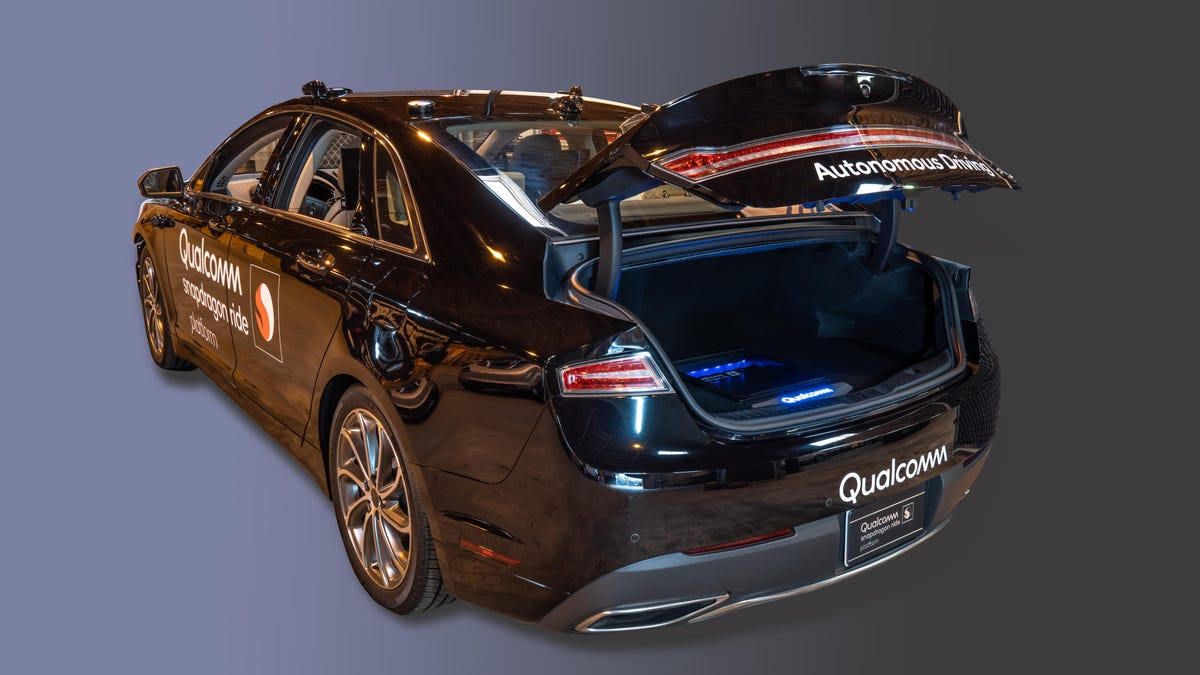Qualcomm makes cars even smarter with its newest Snapdragon auto chipsets
The company has brought features from smartphones into vehicles.

Qualcomm has worked to make cars smarter and connected.
Some tech experts have compared modern cars to giant smartphones on wheels. And on Tuesday Qualcomm , one of the world's biggest wireless chipmakers, introduced new innovations that play right into that description by making cars even smarter and more connected.
The company, during a two-day virtual Automotive Redefined event held in lieu of CES , unveiled its fourth-gen Snapdragon Automotive Cockpit Platforms, which will arrive in cars in late 2023 or 2024. The technology is based on 5-nanometer chip manufacturing, which provides high performance while consuming less energy. And it's designed to take advantage of what automakers are planning inside the "digital cockpit" of a vehicle -- several years in the future.
"The car becomes an extension of your living room and of your office," Nakul Duggal, senior vice president and general manager of Qualcomm's auto business, said in an interview ahead of Tuesday's event. "You will have much higher levels of productivity, ... much higher levels of entertainment [and] a lot of ecosystems that are today available to you in your home or your office or on your phone ... will become part of your car."
Cars will be more aware of their surroundings, making them safer, he said. They'll also start driving themselves.
"Those are things [that] are starting to happen now," Duggal said. "And you will see a whole lot more of that in the next four or five years."
The fourth-gen Snapdragon Automotive Cockpit Platforms feature improved graphics, multimedia, computer vision and AI capabilities that allow the cockpit to be more aware and adaptable to passengers' preferences. It can support 10 or more multiple high-definition displays, which can be used for entertainment at the same time as others are being relied on for navigation. The platforms also support multiple high-definition camera inputs to monitor what's happening in or around the car.
The improved AI capabilities will enable more driver and passenger personalization, in-car virtual assistance, natural voice control, language understanding, driver monitoring and occupant presence detection. The technology can constantly learn and adapt to the occupants' preferences when it comes to infotainment and vehicle controls like seat and mirror positioning, HVAC and per-seat personalized climate bubbles, audio content and volume preferences.
It's also better at providing "distraction-free driver assistance systems," including in-cabin monitoring, child and occupant detection and ultra-HD surround view monitoring with object detection for roadside safety.
The platforms also allow for immersive audio, letting automakers set up personalized audio zones for each user. They'll also allow drivers to turn on active noise and echo cancellation to cover up engine and road noise.
Qualcomm's core technology connects devices -- including Apple's iPhone 12 lineup -- to cellular networks, and acts as the brains of phones such as Samsung's Galaxy S21 devices. It's benefitted from soaring demand for 5G chips as the tech industry moves to the newest standard of connectivity. But Qualcomm also has invested in areas like automotive to provide a buffer against a slowdown in phones. There are about 150 millions of cars on the road with Qualcomm's technology. Vehicles using its third-gen Snapdragon Automotive Cockpit Platform will be available this year.
While it's built technology to run the digital cockpit of a car, Qualcomm last year also moved into providing technology to make it easier and more power efficient for automakers to turn their vehicles into self-driving cars. Vehicles with Snapdragon Ride could start hitting the road next year. And on Tuesday, Qualcomm said it's improved its Snapdragon Ride chipsets for up to a Level 4 automated system, which is where a car handles the majority of driving situations on its own.
Along with the fourth-gen Snapdragon Automotive Cockpit Platform, Qualcomm said its technology now integrates Amazon's Alexa voice assistant onto its chipsets. That makes it easier for automakers to use the AI in cars to do things like sync with Alexa in the home to open the garage door when arriving home or turn on living room lights.
"It reduces and removes a lot of friction if [automakers] had to go [embed Alexa technology] by themselves across 20 or 30 models," Duggal said. "Automakers are able to get a turnkey platform with us."

